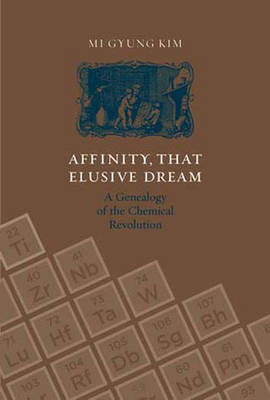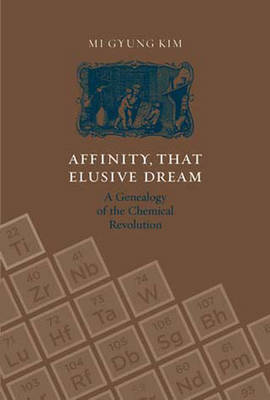
- Afhalen na 1 uur in een winkel met voorraad
- Gratis thuislevering in België vanaf € 30
- Ruim aanbod met 7 miljoen producten
- Afhalen na 1 uur in een winkel met voorraad
- Gratis thuislevering in België vanaf € 30
- Ruim aanbod met 7 miljoen producten
Zoeken
€ 67,95
+ 135 punten
Omschrijving
In the eighteenth century, chemistry was transformed from an art to a public science. Chemical affinity played an important role in this process as a metaphor, a theory domain, and a subject of investigation. Goethe's Elective Affinities, which was based on the current understanding of chemical affinities, attests to chemistry's presence in the public imagination. In Affinity, That Elusive Dream, Mi Gyung Kim restores chemical affinity to its proper place in historiography and in Enlightenment public culture. The Chemical Revolution is usually associated with Antoine-Laurent Lavoisier, who introduced a modern nomenclature and a definitive text. Kim argues that chemical affinity was erased from historical memory by Lavoisier's omission of it from his textbook. She examines the work of many less famous French chemists (including physicians, apothecaries, metallurgists, philosophical chemists, and industrial chemists) to explore the institutional context of chemical instruction and research, the social stratification that shaped theoretical discourse, and the crucial shifts in analytic methods. Apothecaries and metallurgists, she shows, shaped the main theory domains through their innovative approach to analysis. Academicians and philosophical chemists brought about two transformative theoretical moments through their efforts to create a rational discourse of chemistry in tune with the reigning natural philosophy. The topics discussed include the corpuscular (Cartesian) model in French chemistry in the early 1700s, the stabilization of the theory domains of composition and affinity, the reconstruction of French theoretical discourse in the middle of the eighteenth century, the Newtonian languages that plagued the domain of affinity just before the Chemical Revolution, Guyton de Morveau's program of affinity chemistry, Lavoisier's reconstruction of the theory domains of chemistry, and Berthollet's path as an affinity chemist.
Specificaties
Betrokkenen
- Auteur(s):
- Uitgeverij:
Inhoud
- Aantal bladzijden:
- 613
- Taal:
- Engels
- Reeks:
Eigenschappen
- Productcode (EAN):
- 9780262612234
- Verschijningsdatum:
- 1/03/2008
- Uitvoering:
- Paperback
- Formaat:
- Trade paperback (VS)
- Afmetingen:
- 153 mm x 222 mm
- Gewicht:
- 784 g

Alleen bij Standaard Boekhandel
+ 135 punten op je klantenkaart van Standaard Boekhandel
Beoordelingen
We publiceren alleen reviews die voldoen aan de voorwaarden voor reviews. Bekijk onze voorwaarden voor reviews.











